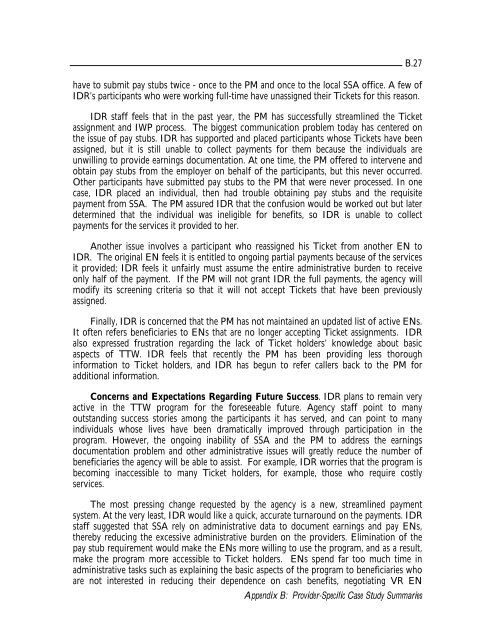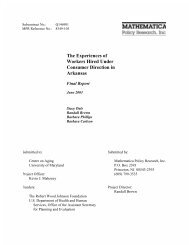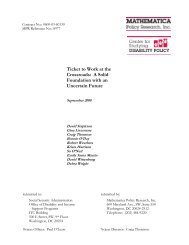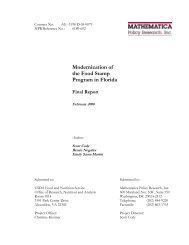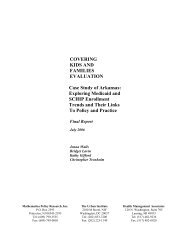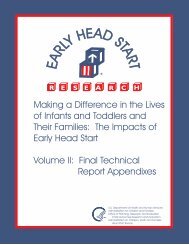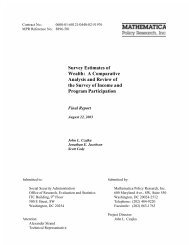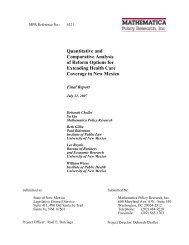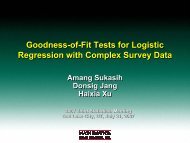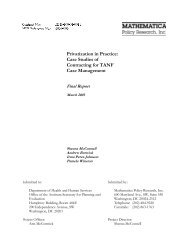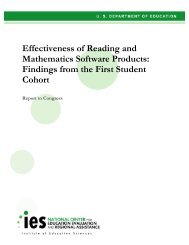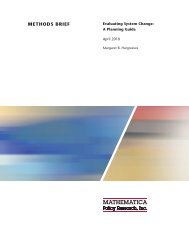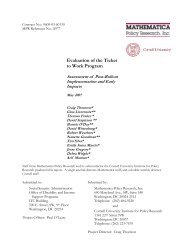Evaluation of the Ticket to Work Program Initial Evaluation Report
Evaluation of the Ticket to Work Program Initial Evaluation Report
Evaluation of the Ticket to Work Program Initial Evaluation Report
You also want an ePaper? Increase the reach of your titles
YUMPU automatically turns print PDFs into web optimized ePapers that Google loves.
B.27<br />
have <strong>to</strong> submit pay stubs twice - once <strong>to</strong> <strong>the</strong> PM and once <strong>to</strong> <strong>the</strong> local SSA <strong>of</strong>fice. A few <strong>of</strong><br />
IDR’s participants who were working full-time have unassigned <strong>the</strong>ir <strong>Ticket</strong>s for this reason.<br />
IDR staff feels that in <strong>the</strong> past year, <strong>the</strong> PM has successfully streamlined <strong>the</strong> <strong>Ticket</strong><br />
assignment and IWP process. The biggest communication problem <strong>to</strong>day has centered on<br />
<strong>the</strong> issue <strong>of</strong> pay stubs. IDR has supported and placed participants whose <strong>Ticket</strong>s have been<br />
assigned, but it is still unable <strong>to</strong> collect payments for <strong>the</strong>m because <strong>the</strong> individuals are<br />
unwilling <strong>to</strong> provide earnings documentation. At one time, <strong>the</strong> PM <strong>of</strong>fered <strong>to</strong> intervene and<br />
obtain pay stubs from <strong>the</strong> employer on behalf <strong>of</strong> <strong>the</strong> participants, but this never occurred.<br />
O<strong>the</strong>r participants have submitted pay stubs <strong>to</strong> <strong>the</strong> PM that were never processed. In one<br />
case, IDR placed an individual, <strong>the</strong>n had trouble obtaining pay stubs and <strong>the</strong> requisite<br />
payment from SSA. The PM assured IDR that <strong>the</strong> confusion would be worked out but later<br />
determined that <strong>the</strong> individual was ineligible for benefits, so IDR is unable <strong>to</strong> collect<br />
payments for <strong>the</strong> services it provided <strong>to</strong> her.<br />
Ano<strong>the</strong>r issue involves a participant who reassigned his <strong>Ticket</strong> from ano<strong>the</strong>r EN <strong>to</strong><br />
IDR. The original EN feels it is entitled <strong>to</strong> ongoing partial payments because <strong>of</strong> <strong>the</strong> services<br />
it provided; IDR feels it unfairly must assume <strong>the</strong> entire administrative burden <strong>to</strong> receive<br />
only half <strong>of</strong> <strong>the</strong> payment. If <strong>the</strong> PM will not grant IDR <strong>the</strong> full payments, <strong>the</strong> agency will<br />
modify its screening criteria so that it will not accept <strong>Ticket</strong>s that have been previously<br />
assigned.<br />
Finally, IDR is concerned that <strong>the</strong> PM has not maintained an updated list <strong>of</strong> active ENs.<br />
It <strong>of</strong>ten refers beneficiaries <strong>to</strong> ENs that are no longer accepting <strong>Ticket</strong> assignments. IDR<br />
also expressed frustration regarding <strong>the</strong> lack <strong>of</strong> <strong>Ticket</strong> holders’ knowledge about basic<br />
aspects <strong>of</strong> TTW. IDR feels that recently <strong>the</strong> PM has been providing less thorough<br />
information <strong>to</strong> <strong>Ticket</strong> holders, and IDR has begun <strong>to</strong> refer callers back <strong>to</strong> <strong>the</strong> PM for<br />
additional information.<br />
Concerns and Expectations Regarding Future Success. IDR plans <strong>to</strong> remain very<br />
active in <strong>the</strong> TTW program for <strong>the</strong> foreseeable future. Agency staff point <strong>to</strong> many<br />
outstanding success s<strong>to</strong>ries among <strong>the</strong> participants it has served, and can point <strong>to</strong> many<br />
individuals whose lives have been dramatically improved through participation in <strong>the</strong><br />
program. However, <strong>the</strong> ongoing inability <strong>of</strong> SSA and <strong>the</strong> PM <strong>to</strong> address <strong>the</strong> earnings<br />
documentation problem and o<strong>the</strong>r administrative issues will greatly reduce <strong>the</strong> number <strong>of</strong><br />
beneficiaries <strong>the</strong> agency will be able <strong>to</strong> assist. For example, IDR worries that <strong>the</strong> program is<br />
becoming inaccessible <strong>to</strong> many <strong>Ticket</strong> holders, for example, those who require costly<br />
services.<br />
The most pressing change requested by <strong>the</strong> agency is a new, streamlined payment<br />
system. At <strong>the</strong> very least, IDR would like a quick, accurate turnaround on <strong>the</strong> payments. IDR<br />
staff suggested that SSA rely on administrative data <strong>to</strong> document earnings and pay ENs,<br />
<strong>the</strong>reby reducing <strong>the</strong> excessive administrative burden on <strong>the</strong> providers. Elimination <strong>of</strong> <strong>the</strong><br />
pay stub requirement would make <strong>the</strong> ENs more willing <strong>to</strong> use <strong>the</strong> program, and as a result,<br />
make <strong>the</strong> program more accessible <strong>to</strong> <strong>Ticket</strong> holders. ENs spend far <strong>to</strong>o much time in<br />
administrative tasks such as explaining <strong>the</strong> basic aspects <strong>of</strong> <strong>the</strong> program <strong>to</strong> beneficiaries who<br />
are not interested in reducing <strong>the</strong>ir dependence on cash benefits, negotiating VR EN<br />
Appendix B: Provider-Specific Case Study Summaries


